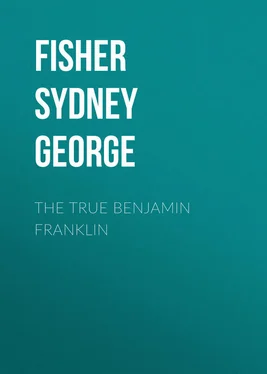Sydney Fisher - The True Benjamin Franklin
Здесь есть возможность читать онлайн «Sydney Fisher - The True Benjamin Franklin» — ознакомительный отрывок электронной книги совершенно бесплатно, а после прочтения отрывка купить полную версию. В некоторых случаях можно слушать аудио, скачать через торрент в формате fb2 и присутствует краткое содержание. Жанр: История, foreign_antique, foreign_prose, Биографии и Мемуары, на английском языке. Описание произведения, (предисловие) а так же отзывы посетителей доступны на портале библиотеки ЛибКат.
- Название:The True Benjamin Franklin
- Автор:
- Жанр:
- Год:неизвестен
- ISBN:нет данных
- Рейтинг книги:4 / 5. Голосов: 1
-
Избранное:Добавить в избранное
- Отзывы:
-
Ваша оценка:
- 80
- 1
- 2
- 3
- 4
- 5
The True Benjamin Franklin: краткое содержание, описание и аннотация
Предлагаем к чтению аннотацию, описание, краткое содержание или предисловие (зависит от того, что написал сам автор книги «The True Benjamin Franklin»). Если вы не нашли необходимую информацию о книге — напишите в комментариях, мы постараемся отыскать её.
The True Benjamin Franklin — читать онлайн ознакомительный отрывок
Ниже представлен текст книги, разбитый по страницам. Система сохранения места последней прочитанной страницы, позволяет с удобством читать онлайн бесплатно книгу «The True Benjamin Franklin», без необходимости каждый раз заново искать на чём Вы остановились. Поставьте закладку, и сможете в любой момент перейти на страницу, на которой закончили чтение.
Интервал:
Закладка:
“4. Do you love truth for truth’s sake, and will you endeavor impartially to find and receive it yourself and communicate it to others? Answer: Yes.”
At every meeting certain questions were read, with a pause after each one; and these questions might very well have been suggested by those of the Mather benefit societies. The first six are sufficient to give an idea of them all:
“1. Have you met with anything in the author you last read, remarkable or suitable to be communicated to the Junto, particularly in history, morality, poetry, physic, travels, mechanic arts, or other parts of knowledge?
“2. What new story have you lately heard, agreeable for telling in conversation?
“3. Hath any citizen in your knowledge failed in his business lately, and what have you heard of the cause?
“4. Have you lately heard of any citizen’s thriving well, and by what means?
“5. Have you lately heard how any present rich man, here or elsewhere, got his estate?
“6. Do you know of a fellow-citizen, who has lately done a worthy action, deserving praise and imitation; or who has lately committed an error, proper for us to be warned against and avoid?”
The number of members was limited to twelve, and Franklin always opposed an increase. Instead of adding to the membership, he suggested that each member form a similar club, and five or six were thus organized, with such names as The Vine, The Union, The Band. The original club is said to have continued for forty years. But it did not keep up its old character. Its original purpose had been to educate its members, to supply the place of the modern academy or college; but when the members became older and their education more complete, they cared no longer for self-imposed tasks of essay-writing and formal debate on set questions. They turned it into a social club, or, rather, they dropped its educational and continued its social side, – for it had always been social, and even convivial, which was one of the means adopted for keeping the members together and rendering their studies easy and pleasant.
A list of some of the questions discussed by the Junto has been preserved, from which a few are given as specimens:
“Is sound an entity or body?
“How may the phenomena of vapors be explained?
“Is self-interest the rudder that steers mankind?
“Which is the best form of government, and what was that form which first prevailed among mankind?
“Can any one particular form of government suit all mankind?
“What is the reason that the tides rise higher in the Bay of Fundy than in the Bay of Delaware?”
The young men who every Friday evening debated such questions as these were certainly acquiring an education which was not altogether an inferior substitute for that furnished by our modern institutions endowed with millions of dollars and officered by plodding professors prepared by years of exhaustive study. But the plodding professors and the modern institutions are necessary, because young men, as a rule, cannot educate themselves. The Junto could not have existed without Franklin. He inspired and controlled it. His personality and energy pervaded it, and the eleven other members were but clay in his hands. His rare precocity and enthusiasm inspired a love for and an interest in study which money, apparatus, and professors often fail to arouse.
The Junto debated the question of paper money, which was then agitating the Province of Pennsylvania, and Franklin was led to write and publish a pamphlet called “A Modest Inquiry into the Nature and Necessity of a Paper Currency,” a very crude performance, showing the deficiencies of his self-education. The use of the word modest in the title was in pursuance of the shrewd plan he had adopted of affecting great humility in the expression of his opinions. But his description in his Autobiography of the effect of this pamphlet is by no means either modest or humble:
“It was well received by the common people in general; but the rich men disliked it, for it increased and strengthened the clamor for more money, and they happening to have no writers among them that were able to answer it their opposition slackened, and the point was carried by a majority in the House.”
In other words, he implies that the boyish debate of twelve young workingmen, resulting in the publication of a pamphlet by one of them, was the means of passing the Pennsylvania paper-money act of 1729. His biographers have echoed his pleasant delusion, and this pamphlet, which in reality contains some of the most atrocious fallacies in finance and political economy, has been lauded as a wonder, the beginning of modern political economy, and the source from which Adam Smith stole the material for his “Wealth of Nations.” 2 2 Pennsylvania: Colony and Commonwealth, p. 80.
In spite of all his natural brightness and laudable efforts for his own improvement, he was but half educated and full of crude enthusiasm. He was only twenty-three, and nothing more could be expected.
Fifteen or twenty years afterwards, with added experience, Franklin became a very different sort of person. The man of forty, laboriously investigating science, discovering the secrets of electricity, and rejecting everything that had not been subjected to the most rigid proof, bore but little resemblance to the precocious youth of twenty-three, the victim of any specious sophism that promised a millennium. But he never fully apologized to the world for his paper-money delusion, contenting himself with saying in his Autobiography, “I now think there are limits beyond which the quantity may be hurtful.”
Three years after the publication of his pamphlet on paper money he began to study modern languages, and soon learned to read French, Italian, and Spanish. An acquaintance who was also studying Italian often tempted him to play chess. As this interfered with the Italian studies, Franklin arranged with him that the victor in any game should have the right to impose a task, either in grammar or translation; and as they played equally, they beat each other into a knowledge of the language.
After he had become tolerably well acquainted with these modern languages he happened one day to look into a Latin Testament, and found that he could read it more easily than he had supposed. The modern languages had, he thought, smoothed the way for him, and he immediately began to study Latin, which had been dropped ever since, as a little boy, he had spent a year in the Boston Grammar School.
From this circumstance he jumped to the conclusion that the usual method pursued in schools of studying Latin before the modern languages was all wrong. It would be better, he said, to begin with the French, proceed to the Italian, and finally reach the Latin. This would be beginning with the easiest first, and would also have the advantage that if the pupils should quit the study of languages, and never arrive at the Latin, they would have acquired another tongue or two which, being in modern use, might be serviceable to them in after-life.
This suggestion, though extravagantly praised, has never been adopted, for the modern languages are now taught contemporaneously with Latin. It was an idea founded exclusively on a single and very unusual experience, without any test as to its general applicability. But all Franklin’s notions of education were extremely radical, because based on his own circumstances, which were not those of the ordinary youth, to whom all systems of education have to be adapted.
He wished to entirely abolish Latin and Greek. They had been useful, he said, only in the past, when they were the languages of the learned and when all books of science and important knowledge were written in them. At that time there had been a reason for learning them, but that reason had now passed away. English should be substituted for them, and its systematic study would give the same knowledge of language-structure and the same mental training that were supposed to be attainable only through Latin and Greek. His own self-education had been begun in English. He had analyzed and rewritten the essays in Addison’s Spectator , and, believing that in this way he had acquired his own most important mental training, he concluded that the same method should be imposed on every one. He wished to set up the study of that author and of Pope, Milton, and Shakespeare as against Cicero, Virgil, and Homer.
Читать дальшеИнтервал:
Закладка:
Похожие книги на «The True Benjamin Franklin»
Представляем Вашему вниманию похожие книги на «The True Benjamin Franklin» списком для выбора. Мы отобрали схожую по названию и смыслу литературу в надежде предоставить читателям больше вариантов отыскать новые, интересные, ещё непрочитанные произведения.
Обсуждение, отзывы о книге «The True Benjamin Franklin» и просто собственные мнения читателей. Оставьте ваши комментарии, напишите, что Вы думаете о произведении, его смысле или главных героях. Укажите что конкретно понравилось, а что нет, и почему Вы так считаете.









![Benjamin Franklin - Memoirs of Benjamin Franklin; Written by Himself. [Vol. 2 of 2]](/books/747975/benjamin-franklin-memoirs-of-benjamin-franklin-wr-thumb.webp)
![Benjamin Franklin - Memoirs of Benjamin Franklin; Written by Himself. [Vol. 1 of 2]](/books/748053/benjamin-franklin-memoirs-of-benjamin-franklin-wr-thumb.webp)

